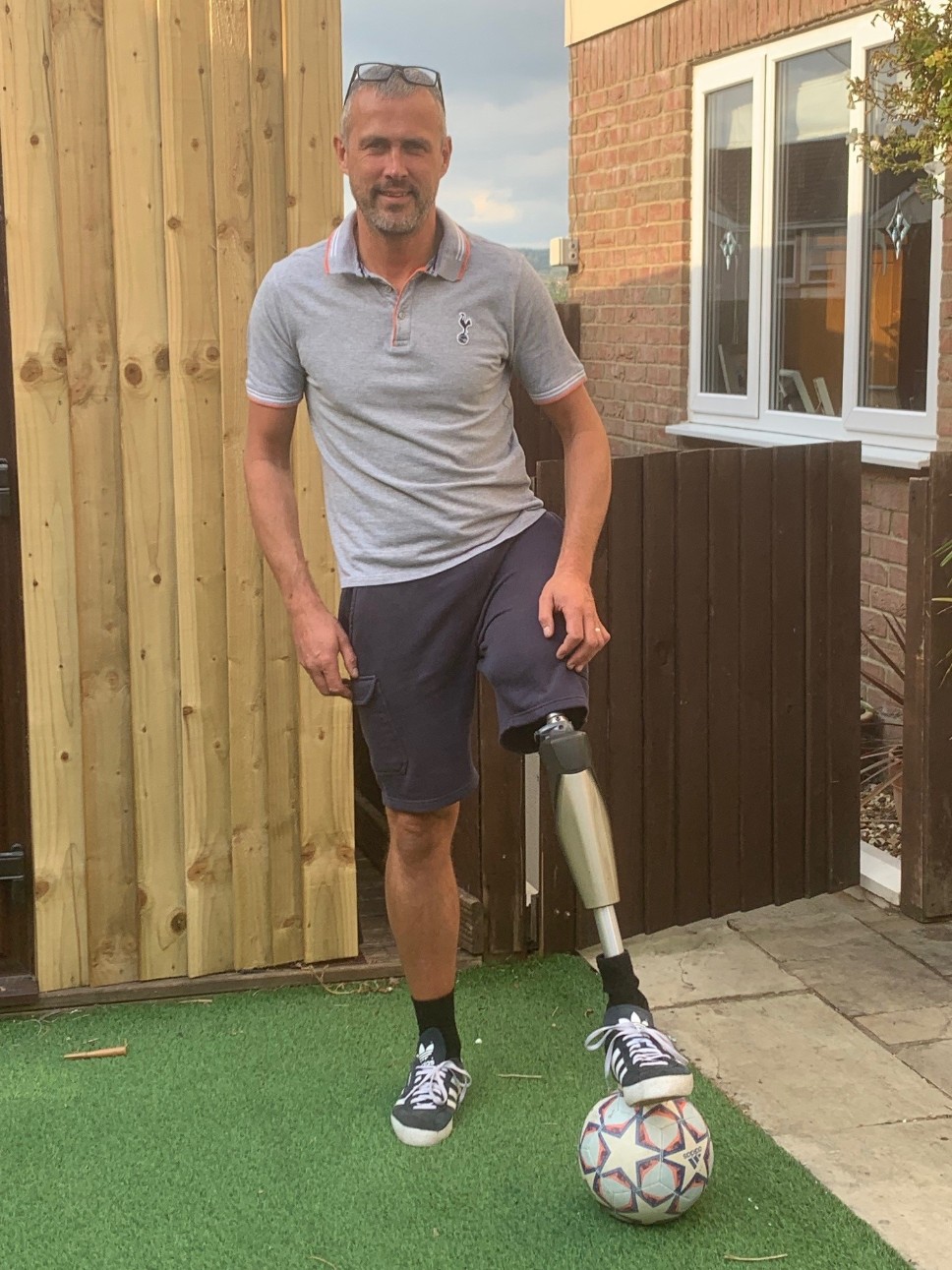
Life changing mobility technology helps Ebbw Vale football coach amputee join in again
Hyfforddwr pêl-droed o Lyn Ebwy yn ailafael yn llawn yn y gêm diolch i dechnoleg symudedd
49-year-old Martin Padfield – an amputee of 24 years – can join in with his son's football team again thanks to Welsh Government funded specialist Microprocessor Controlled Prosthetic knees
Martin is one of 80 people across Wales who have had their mobility transformed by Microprocessor Controlled Prosthetic Knees (MPKs), since the £700,000 Welsh Government fund was launched two years ago.
The funding was split across the three artificial limb and appliance centres (ALAC) located in Swansea, Cardiff and Wrexham.
MPKs are a type of prosthetic knee, used by people who have lost a leg at or above the knee. It improves people’s quality of life by giving the best mobility and function possible.
The knee uses computer technology to provide increased stability, enable safer walking and constantly monitors the user’s pattern of walking depending on their weight and speed – making it easier for them to navigate slopes, stairs, and uneven surfaces.
Martin Padfield has coached his son's under 13s football team for the last 7 years and is also an engineering manager in a busy food manufacturing industry. He lives an active lifestyle both in, and outside of work.
A road traffic accident in August 2000 resulted in Martin losing his leg below the knee.
A year later, further complications caused him to have another amputation above the knee – putting him out of work for almost 3 years.
In 2021, Martin met with the Swansea ALAC team, and was told he would be eligible for an MPK.
Martin Padfield said:
Ever since I lost my leg, I researched constantly about what’s available for me. I read about how life-changing they had been for people who lived a similar active lifestyle to me.
Before 2021, MPKs were available to veterans only. So, I explored the avenues of buying the best myself, and even thought about remortgaging my house at one point, but I never got to that stage.
So, when I was told that I had been selected to receive an MPK, I cannot express how elated I was. From day 1 of having the MPK, I can’t put into words how much of an immense difference it has made to every aspect of my life.
Everything I can do with it has been completely life changing. It’s been revolutionary.
He added:
I’ve been coaching my boys for 7 years. I used to play football before my accident. And coaching the team was a way of me getting my interest back into playing football again.
But having the MPK means that I can join in a lot more, and I can do more than just standing on the sidelines and talking.
Before having the MPK, stumbles weren't common, but they were often. I would have to concentrate and think more when I was walking on uneven terrain or on a slope.
Now, I have 100% confidence in my leg - sometimes I forget it’s there. I just go on with my daily duties with so much more ease and confidence.
I’m so grateful that I was lucky enough to be chosen to have an MPK. It's made a massive difference to my quality of life and I’m sure it would be for anyone else.
I was a lucky boy. It could've been a much darker picture. Life is good now; I've got no complaints at all.
Martin thanked and expressed his gratitude to the Swansea ALAC team for their commitment to ensuring that he had the best care and support throughout.
Notes to editors
- For interviews with Martin Padfield, please contact hss-pressteam@gov.wales
- The NHS Wales MPK funding commenced in April 2021 and was split across the three artificial limb and appliance centres (ALACs) in Swansea, Cardiff and Wrexham.
- These types of knee joints are available to those eligible via the NHS prosthetic and amputee rehab services, delivered by the 3 specialist ALACs.
- These MPKs are provided to those who meet specific clinical criteria. In order to benefit from MPKs, patients will have a thorough joint assessment by a Prosthetist and a Physiotherapist. They will require a level of fitness and stamina and need to meet specific criteria set out in the following - policy (P10) nhs.wales/commissioning/whssc-policies/all-policy-documents/microprocessor-controlled-prosthetic-knees-commissioning-policy-cp218-december-2021/ .
